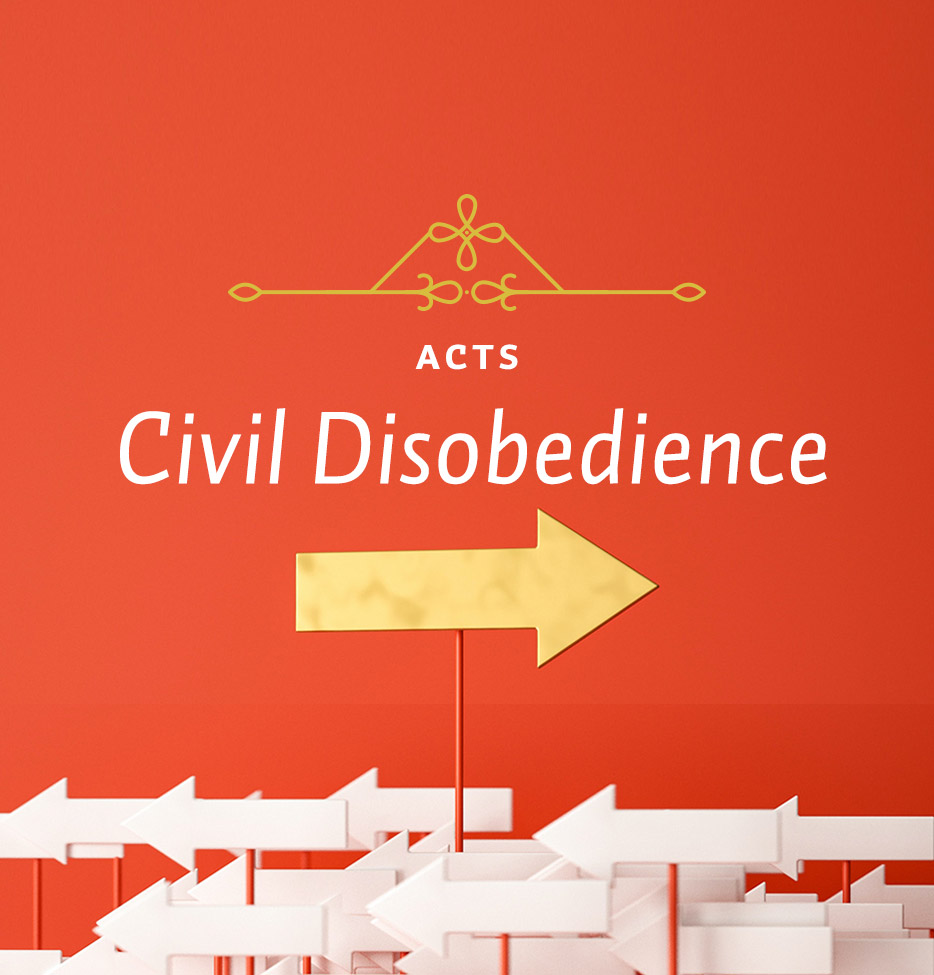The disciples responded to the authorities by disobeying the state, and this raises the question of civil disobedience. The very thought disturbs many people. Some years ago, when Francis Schaeffer was still alive, the well-known Christian apologist published a book called A Christian Manifesto.1 In it he said in clear language that in certain circumstances Christians are obliged to disobey the state. A lot of evangelicals got very upset at that. They said, “Oh, we mustn’t disobey the state. God has established the state. We must submit to the state. Why, in Romans it says, ‘The authorities that exist have been established by God. Consequently, he who rebels against the authority is rebelling against what God has instituted.’” They didn’t like Francis Schaeffer’s book.
This is an area in which we must be extremely careful, of course. We tend to rebel easily. We rebel when we should clearly submit. But this is not the same thing as saying that we must obey the state at all times and in all circumstances. Obviously not! Because if you find yourself saying in categorical terms, “I must do whatever the state says I must do,” then you are making the state your god. Unless the state is as wise and perfect as God, always expressing the perfect will of God, it is inevitable that in some situations the state is going to demand action that is contrary to God’s laws. Then, if you are following God, you are going to have to disobey the authorities.
When we speak about the relationship between “God and Caesar,” to use Jesus’ words, there really are only four options.
The first is God alone with the authority of Caesar denied. This view emerged early in the history of the church, in monasticism. Monks said, “The world and its governments are so corrupt they are all of the devil. We can have nothing to do with them. The only thing we can do as Christians is retreat from the world.” So they did it. They moved into the desert. These people became something of a curiosity, and people flocked out to see them. There wasn’t a lot to entertain a person in those days, of course, so a hermit in the desert became an attraction. When people went out into the desert to see them, these monastic figures moved farther into the desert and then still farther. Eventually some of them got the idea that the only way really to escape the world was to climb to the top of a stone pillar, where nobody could get to them. So they did.
One of these men, a very famous man, was Simon Stylites. He lived on the top of a seventy-foot-high pillar for about thirty years. It was from figures like these and other less extreme people that the monastic orders began.
We are not so extreme today. Americans are not very extreme about anything. We just take things as they come. We compromise right and left. Yet we have a form of this option which is withdrawal from what we would call “civic responsibility.” People who fall into this category say, “I’m not interested in voting because, after all, politicians are all equally bad. None of them stands for anything. I am just going to stay home, go to church, raise my children and ignore the world.” That is our evangelical form of denying any legitimate place to civil government. Fortunately, we are seeing revival of civic responsibility among evangelicals in our day, and that is a healthy thing. Nevertheless, some still fall into this category.
It is worth noting when we talk about the state being a legitimate authority that we have the example of Jesus Christ to appeal to. When he was arrested and appeared before Pilate, not once in the entire trial did Jesus suggest that the authority of Pilate was illegitimate, even though Pilate was about to commit the great injustice of condemning an utterly innocent man. Jesus did not say, “We cannot tolerate injustice like this in our world. We must rise up against it. That is what I am going to tell my followers to do. I am going to say, ‘This is a bad world. You must fight it. Raise an army. Get people like Pilate out of here.’” Jesus never did that.
In the course of the trial Pilate said to Jesus, “Don’t you realize I have power [the Greek word is exousia; it really means ‘authority’] either to free you or to crucify you?”
How did Jesus reply? He did not say, “No, you don’t.” He said, “Yes, you do.” But notice how He said it: “You would have no power [authority] over me if it were not given to you from above. Therefore the one who handed me over to you is guilty of a greater sin” (John 19:10-11). Pilate had authority; Jesus recognized that. But when He brought the matter of sin into the equation He added the matter of responsibility, indicating that although Pilate had authority, it was a delegated authority. His authority was given to him by God. Therefore, he was responsible to God for how he used it.
That is what Christians need to tell the state. They are not to deny the state’s authority, still less assume civil authority themselves. But they are to remind the state that its authority comes to it from God. The state is responsible to God for what it does.
1Francis A. Schaeffer, A Christian Manifesto (Westchester, IL: Crossway, 1981).






